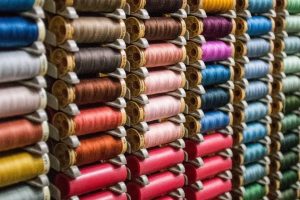Tirupur’s complicated relationship with China

Photo by Héctor J. Rivas on Unsplash
One among the many, that the coronavirus pandemic highlighted, amplified — is the complicated relationship Tirupur, a textile cluster in Tamil Nadu has with China. Tirupur exports about Rs 26,000 crore worth of textile products primarily to Europe and US. It also has a domestic sales of about Rs 24,000 crore.
China is a competitor in both of these segments. Textile manufacturers in this small town are constantly worried about the impact China has on prices and their own market share. Earlier this year, when the demand for masks and PPE went up, Tirupur quickly tweaked its production lines to manufacture these products. Tirupur Exporters’ Association lobbied with the government to stop procuring these from China and buy locally manufactured goods instead.
Similarly, diverse manufacturers hope to gain some market share in the US, Europe and Japan with the anti-China sentiment triggered by the pandemic. Textile manufacturers in the town hope to increase their sales to Rs 1 lakh crore by 2022 (assuming things pick up), and some of this share would be of countries that want to spread the risk, sourcing from multiple countries.
At the same time, Chinese are also huge suppliers to Tirupur manufacturers. China supplies 90% of Tirupur’s garment accessories such as zippers and buttons. They want Chinese products because it’s cheaper, and sometimes, their customers insist on brands that come from China. Even where raw materials are sourced from India, there are second order dependencies. For example, Tirupur sources 80–85% of its dyes from Gujarat. But, dye manufacturers in Gujarat get most of their raw materials from China. Because of the supply chain disruptions, work in progress inventory is piling up in Tirupur for the want of buttons and zippers, and there are fears that the end product will cost more if the price of dyes go up because of short supply.
China dependence goes even more upstream. Most sewing machines and needles one sees in Tirupur are sourced from China, again owing to cost and quality reasons.
In short, Tirupur needs China, at least for the short run. What about long run?
While the pandemic has forced people to question their assumptions about the direction of the industry, a few manufacturers I spoke to, emphasised how it will be guided by three broad principles:
- Reduce dependence on China: It might not be possible to completely cut ties with China, but it’s possible to spread the risk, and look for more sources.
- Build capabilities in India : Many believe that capabilities are all about scale. While it’s important, we need to build capacities across the value chain, including in marketing and design.
- Don’t ignore the domestic market : While domestic sales account for about Rs 24,000 crore (of the Rs 60,000 crore), there is more that can be done to push domestic sales across the value chain.
This research was developed as part of the Bharat Inclusion Research Fellowship.
